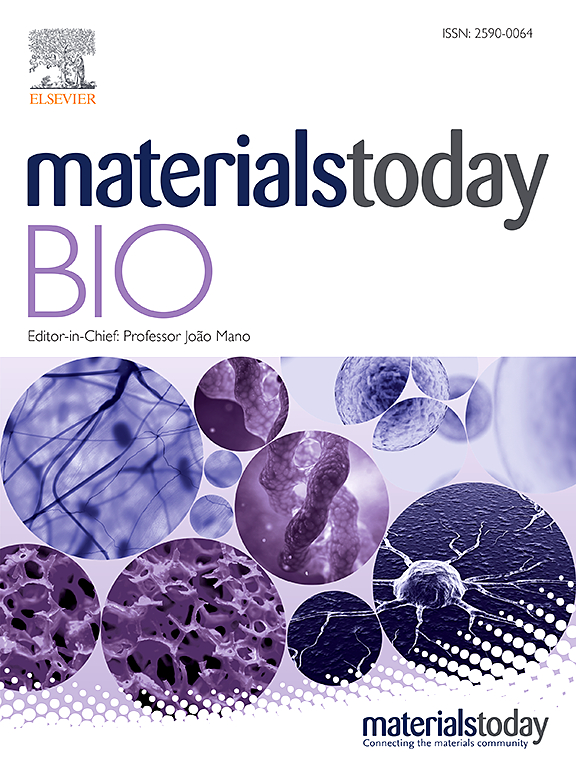Dominant follicle-targeted nanocarriers for GH delivery to alleviate premature ovarian insufficiency
IF 8.7
1区 医学
Q1 ENGINEERING, BIOMEDICAL
引用次数: 0
Abstract
Premature ovarian insufficiency (POI) is characterized by ovarian functional damage, leading to infertility and severe complications. Current treatment is merely to relieve the clinical symptoms by hormone supplementation. Growth hormone (GH) shows efficacy in restoring ovarian function. However, GH has poor targeting specificity and stability, which limits its clinical application. Dominant follicles play a vital role in ovarian endocrine and reproductive function. Zona pellucida glycoprotein 3 (ZP3) is a specific component of the zona pellucida around the oocyte and is tightly associated with the dominant follicle. Therefore, we constructed a GH-loaded complex zeolitic imidazolate frameworks-8 (ZIF8)-GH@ZP3Ab, which uses ZIF8 to load GH and ZP3 antibody (ZP3Ab) to specifically bind ZP3. The results showed that ZIF8-GH@ZP3Ab had a good targeting ability to ovaries, especially the dominant follicles. This approach promoted the development of dominant follicles without increasing the depletion of primordial follicles. In vivo experiments demonstrated that ZIF8-GH@ZP3Ab promoted angiogenesis, reduced oxidative stress and apoptosis, and enhanced the secretion of IGF-1 in antral follicles. These effects restored ovarian function and fertility in cisplatin-induced POI in mice. In vitro experiments indicated that both ZIF8 and GH can protect granulosa cells from cisplatin-induced oxidative stress and apoptosis. In conclusion, ZIF8-GH@ZP3Ab is promising as an effective nanomedicine for the treatment of POI.
优势卵泡靶向纳米载体GH输送缓解卵巢早衰
卵巢功能不全(POI)的特点是卵巢功能损害,导致不孕和严重的并发症。目前的治疗仅仅是通过补充激素来缓解临床症状。生长激素具有恢复卵巢功能的作用。然而,生长激素的靶向特异性和稳定性较差,限制了其临床应用。显性卵泡在卵巢内分泌和生殖功能中起着至关重要的作用。透明带糖蛋白3 (ZP3)是卵母细胞周围透明带的特异性成分,与显性卵泡密切相关。因此,我们构建了一个GH负载的复杂沸沸体咪唑酸框架-8 (ZIF8)-GH@ZP3Ab,它使用ZIF8负载GH和ZP3抗体(ZP3Ab)特异性结合ZP3。结果表明ZIF8-GH@ZP3Ab对卵巢,尤其是优势卵泡具有良好的靶向能力。这种方法促进了显性卵泡的发育,而不会增加原始卵泡的消耗。体内实验表明,ZIF8-GH@ZP3Ab促进血管生成,减少氧化应激和细胞凋亡,增强窦卵泡IGF-1的分泌。这些作用恢复了顺铂诱导的POI小鼠的卵巢功能和生育能力。体外实验表明,ZIF8和GH均能保护颗粒细胞免受顺铂诱导的氧化应激和凋亡。总之,ZIF8-GH@ZP3Ab是一种治疗POI的有效纳米药物。
本文章由计算机程序翻译,如有差异,请以英文原文为准。
求助全文
约1分钟内获得全文
求助全文
来源期刊

Materials Today Bio
Multiple-
CiteScore
8.30
自引率
4.90%
发文量
303
审稿时长
30 days
期刊介绍:
Materials Today Bio is a multidisciplinary journal that specializes in the intersection between biology and materials science, chemistry, physics, engineering, and medicine. It covers various aspects such as the design and assembly of new structures, their interaction with biological systems, functionalization, bioimaging, therapies, and diagnostics in healthcare. The journal aims to showcase the most significant advancements and discoveries in this field. As part of the Materials Today family, Materials Today Bio provides rigorous peer review, quick decision-making, and high visibility for authors. It is indexed in Scopus, PubMed Central, Emerging Sources, Citation Index (ESCI), and Directory of Open Access Journals (DOAJ).
 求助内容:
求助内容: 应助结果提醒方式:
应助结果提醒方式:


